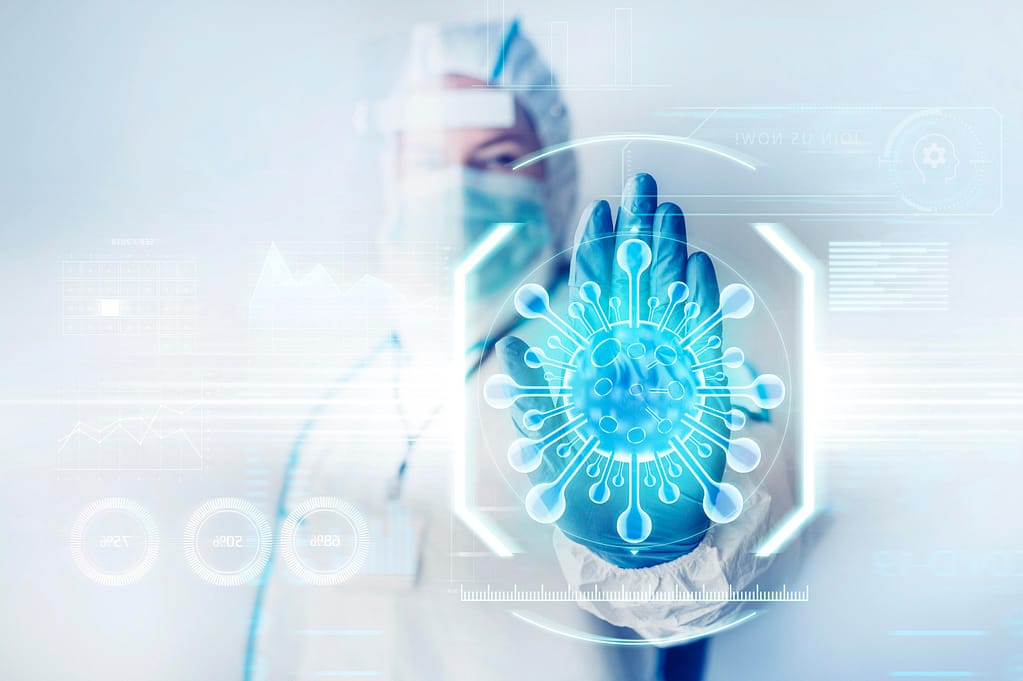AI-driven healthcare is revolutionizing the way we approach medical diagnostics, treatment plans, and patient care. With advancements in artificial intelligence (AI) and machine learning (ML), healthcare professionals now have access to powerful tools that can analyze vast amounts of data, identify patterns, and provide actionable insights. This article explores the transformative impact of AI in healthcare, discussing its benefits, challenges, and future prospects.
1. Introduction: The Rise of AI in Healthcare

In recent years, AI has emerged as a powerful tool in healthcare, transforming the landscape of medicine. By leveraging AI algorithms and ML models, healthcare professionals can analyze complex medical data, detect patterns, and make accurate predictions. AI-driven healthcare has the potential to improve diagnostics, optimize treatment plans, and enhance patient outcomes.
2. AI for Diagnostics: Enhancing Accuracy and Speed
One of the key areas where AI excels in healthcare is diagnostics. AI algorithms can analyze medical imaging scans, such as X-rays, MRIs, and CT scans, with remarkable accuracy and speed. By comparing images with vast databases, AI systems can detect subtle anomalies that may indicate the presence of diseases or conditions, enabling early detection and timely intervention.
3. AI in Treatment Planning: Personalized Medicine
AI is revolutionizing treatment planning by enabling personalized medicine. By analyzing large datasets of patient information, including medical records, genetic profiles, lifestyle factors, and treatment outcomes, AI algorithms can identify patterns and generate tailored treatment plans. This personalized approach can optimize treatment effectiveness, reduce adverse reactions, and improve patient satisfaction.
4. Improving Patient Care with AI

AI-driven healthcare is also enhancing patient care across various domains. Chatbots powered by AI can provide 24/7 support, answering patients’ questions, and providing basic medical advice. Virtual nurses can monitor patients remotely, ensuring compliance with treatment plans and alerting healthcare providers in case of emergencies. AI systems can also predict disease outbreaks, enabling proactive measures for public health management.
5. Ethical Considerations in AI-Driven Healthcare
While the potential of AI in healthcare is vast, it also raises ethical considerations. Ensuring transparency and explainability of AI algorithms is crucial to building trust between patients, healthcare providers, and AI systems. Additionally, addressing biases in data collection and algorithmic decision-making is essential to prevent disparities in healthcare delivery. Striking the right balance between innovation and ethical safeguards is a critical aspect of AI-driven healthcare.
6. Overcoming Challenges: Data Privacy and Security
The widespread use of AI in healthcare necessitates robust data privacy and security measures. Protecting sensitive patient information and ensuring compliance with privacy regulations are vital to maintaining patient trust. Implementing secure data-sharing frameworks and encryption techniques can safeguard patient data while facilitating collaboration and research.
Know more about Data Privacy and Security
7. Future Directions: AI and Precision Medicine
The future of AI-driven healthcare holds immense potential. As AI algorithms continue to evolve, they will become even more accurate, reliable, and interpretable. Integration of AI with emerging technologies such as genomics, wearables, and IoT devices will enable
real-time monitoring and personalized interventions. AI-driven precision medicine will revolutionize disease prevention, early detection, and targeted therapies.
8. Conclusion
In conclusion, AI-driven healthcare represents a transformative leap forward in the field of medicine. With the power of artificial intelligence and machine learning, healthcare professionals now have access to advanced tools and technologies that can revolutionize diagnostics, treatment planning, and patient care. The integration of AI in healthcare brings numerous benefits, including enhanced accuracy and speed in diagnostics, personalized treatment plans, improved patient outcomes, and proactive disease management.
By leveraging AI algorithms, medical professionals can analyze vast amounts of data with incredible precision, leading to earlier and more accurate diagnoses. This timely identification of diseases and conditions allows for prompt interventions and improved treatment outcomes. Moreover, AI enables personalized medicine by considering individual patient characteristics, such as genetic profiles, lifestyle factors, and treatment responses. This tailored approach optimizes treatment effectiveness, reduces adverse reactions, and enhances patient satisfaction.
AI-driven healthcare also extends its impact beyond individual patients. Through the use of chatbots and virtual nurses, AI systems can provide 24/7 support, answering patients’ questions, and monitoring their well-being remotely. This technology-driven approach improves access to healthcare services and enhances patient engagement.
However, as we embrace the potential of AI in healthcare, it is crucial to address ethical considerations and challenges associated with data privacy and security. Transparency, explainability, and fairness in AI algorithms are essential to build trust between patients, healthcare providers, and AI systems. Additionally, robust measures must be in place to protect sensitive patient information and comply with privacy regulations.
In the future, AI-driven healthcare holds immense promise. As AI algorithms continue to evolve, they will become even more accurate, reliable, and interpretable. Integration with emerging technologies, such as genomics, wearables, and IoT devices, will enable real-time monitoring, proactive interventions, and the advancement of precision medicine. However, it is vital to strike a balance between technological advancements and human touch in delivering compassionate and effective healthcare.
Overall, AI-driven healthcare is transforming the future of medicine, enhancing our ability to diagnose, treat, and care for patients. By leveraging the power of AI, we can unlock new possibilities and improve healthcare outcomes for individuals and communities alike. It is an exciting time for the healthcare industry as we witness the positive impact of AI in revolutionizing patient care and shaping a healthier future.
Know More
FAQs
Q1: Can AI replace doctors in healthcare?
AI cannot replace doctors, but it can augment their capabilities and improve the accuracy and efficiency of diagnoses and treatment plans. AI systems work alongside healthcare professionals to enhance patient care.
Q2: Is AI-driven healthcare accessible to all patients?
The accessibility of AI-driven healthcare depends on factors such as infrastructure, cost, and regulatory frameworks. Efforts are being made to ensure equitable access and bridge the digital divide in healthcare.
Q3: How does AI protect patient data privacy?
AI systems employ encryption techniques and secure data-sharing frameworks to protect patient data. Compliance with privacy regulations, such as HIPAA, is crucial to safeguard patient privacy.
Q4: What are the limitations of AI in healthcare?
AI algorithms heavily rely on the quality and diversity of data. Limited or biased datasets can lead to inaccurate results. Additionally, ethical challenges and the need for human oversight remain important considerations.
Q5: What is the future of AI in healthcare?
The future of AI in healthcare is promising. Advancements in AI algorithms, coupled with integration with emerging technologies, will enable precision medicine, proactive disease management, and improved patient outcomes.

2 thoughts on “AI-Driven Healthcare: 6 Ways it Will Completely Disrupt Healthcare”